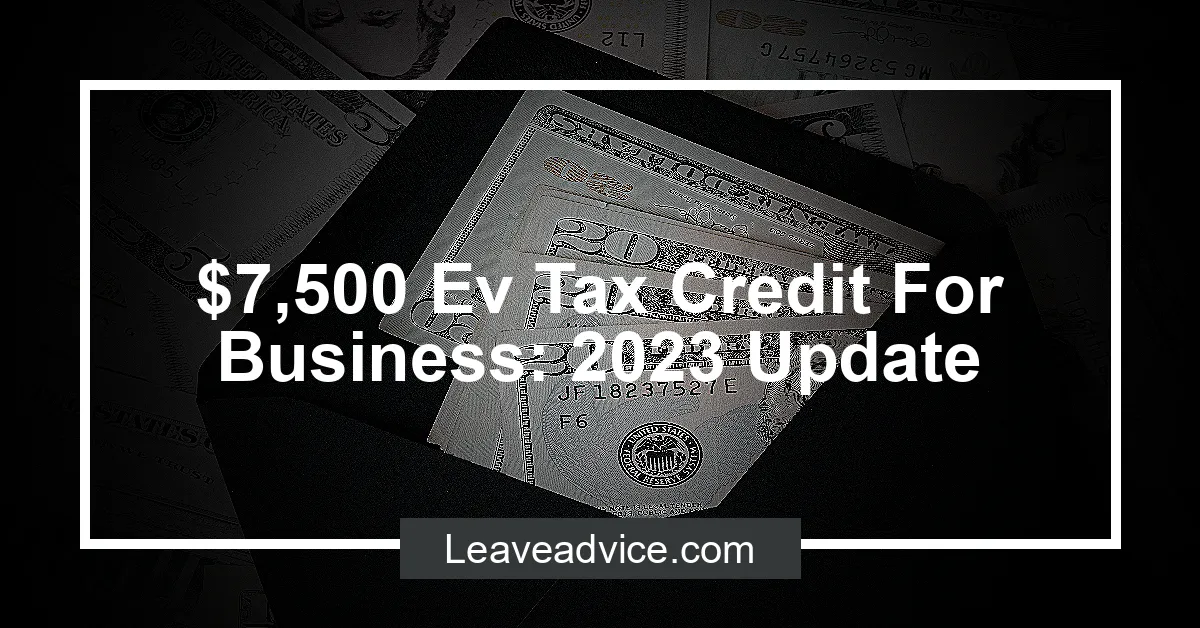$7,500 Ev Tax Credit For Business: 2023 Update


The $7,500 EV tax credit for businesses is a financial incentive provided by the government to encourage the purchase of electric vehicles for business use. Understanding this tax credit is important for businesses looking to reduce their tax liability and invest in sustainable transportation options.
By taking advantage of the $7,500 EV tax credit for business, companies can not only save money on their tax bill but also contribute to the reduction of greenhouse gas emissions and the overall environmental impact of their operations. This tax credit is especially valuable for businesses that are looking to transition to cleaner and more energy-efficient vehicles as part of their sustainability initiatives.
Check out this Youtube video to learn more about the upcoming $7,500 tax credit for EVs starting in 2023 and how it will work!
What is the $7,500 EV Tax Credit for Business?
Definition and explanation of the tax credit
The $7,500 EV tax credit is a financial incentive provided to businesses for the purchase of new electric vehicles (EVs) and fuel cell electric vehicles (FCEVs) starting from January 1, 2023. This credit serves as a direct deduction from the total tax liability of the businesses, encouraging the adoption of cleaner and more sustainable transportation options.
Eligibility criteria for businesses
To be eligible for the $7,500 EV tax credit, businesses need to purchase new clean vehicles with a gross vehicle weight rating (GVWR) below 14,000 pounds (lbs.) and a battery capacity of at least seven kilowatt-hours (kWh). Vehicles with a GVWR above 14,000 lbs. may also qualify for the tax credit, incentivizing businesses of varying sizes to invest in environmentally friendly transportation options.
How to Qualify for the $7,500 EV Tax Credit
Meeting the requirements for claiming the tax credit
To qualify for the $7,500 EV tax credit, you must purchase a new, qualified plug-in EV or fuel cell electric vehicle (FCV). The Inflation Reduction Act of 2022 has brought changes to the rules for this credit for vehicles purchased from 2023 to 2032. Additionally, your income must fall beneath certain thresholds, which are $150,000 or less for individuals, $225,000 for heads of households, or $300,000 for married couples filing jointly.
Documentation and proof needed for eligibility
When you purchase the electric vehicle, you will need to obtain a letter of certification from the dealer. The letter should specify the vehicle’s make, model, and the tax year it qualifies for the EV tax credit.
Moreover, you will need to file Form 8936, Qualified Plug-in Electric Drive Motor Vehicle Credit, with your tax return and provide your vehicle’s VIN. Make sure your total annual adjusted gross income meets the specified thresholds to be eligible for the credit.
Advantages of Claiming the $7,500 EV Tax Credit for Business
Financial benefits for businesses
Claiming the $7,500 EV tax credit can significantly reduce the overall cost of investing in electric vehicles for your business. This tax credit serves as a powerful incentive to make the shift towards sustainable transportation options while also yielding considerable financial benefits for your business.
Long-term savings and advantages of investing in EVs
Investing in electric vehicles offers long-term cost savings and advantages for businesses. With 40% fewer maintenance costs compared to internal combustion engine vehicles, electric vehicles provide a compelling case for long-term financial viability.
Additionally, the longer lifespan of electric vehicles contributes to extended capitalization on the initial investment, ensuring long-term gains for businesses.
How to Claim the $7,500 EV Tax Credit for Business
To claim the $7,500 EV tax credit for business, you must first ensure that the vehicle qualifies for the credit. The credit is applicable when purchasing a new, qualified plug-in electric vehicle or fuel cell electric vehicle.
Then, make sure to take possession of the vehicle and place it into service within the specific time frames outlined by the IRS.
Steps to follow when claiming the tax credit
- Purchase a new, qualified plug-in electric vehicle or fuel cell electric vehicle.
- Take possession of the vehicle within the qualifying time frame.
- Place the vehicle into service within the specified deadlines.
- Retain all necessary documentation and receipts for the vehicle purchase and placing into service.
Important deadlines and timelines to be aware of
| Activity | Deadline |
|---|---|
| Vehicle Purchase | As per IRS guidelines for 2023 or after |
| Placing Vehicle into Service | Within the specified IRS timeframes |
| Retaining Documentation | Indefinitely for tax filing purposes |
Remember, thorough record-keeping and adherence to IRS guidelines are crucial when claiming this tax credit.
Common Misconceptions About the $7,500 EV Tax Credit for Business
There is a lot of confusion surrounding the $7,500 EV tax credit for businesses. Many people believe that this credit applies to all electric vehicles, but this is not the case.
The truth is that only certain models qualify for the full $7,500 credit, while others qualify for half that amount, and some don’t qualify at all. Another common misconception is that the tax credit applies to both new and used electric vehicles.
However, the credit is only applicable to new electric vehicles. Used electric vehicles do not qualify for the full $7,500 credit but may be eligible for a reduced amount, up to $4,000 as a tax credit.
Additionally, there is a misconception that all businesses are eligible for the EV tax credit, but this is not true. Eligibility for the credit depends on specific facts and circumstances, and not all businesses qualify for this tax benefit.
It’s important for businesses and individuals to understand these misconceptions to make informed decisions regarding electric vehicle purchases and tax benefits.
| Misconception | Clarification |
|---|---|
| Applies to all electric vehicles | Only specific models qualify for the full $7,500 credit. |
| Applicable to both new and used electric vehicles | The credit is only for new electric vehicles. |
| Eligibility for all businesses | The eligibility depends on specific facts and circumstances. |
Examples of Businesses Benefiting from the $7,500 EV Tax Credit
According to recent case studies, various businesses have successfully utilized the $7,500 EV tax credit to enhance their financial well-being. For instance, car manufacturers and U. S. car brands have overwhelmingly benefited from this tax credit, especially in promoting the sales of electric vehicles.
Moreover, manufacturing companies have leveraged this credit to invest in research and development, thereby improving their financial health significantly.
Case studies and real-life examples of businesses utilizing the tax credit
It’s fascinating to note that prominent car manufacturers have capitalized on the $7,500 EV tax credit to boost their sales of electric vehicles. Additionally, manufacturing companies have taken advantage of this credit to drive innovation and research, leading to unprecedented growth and financial improvements.
Testimonials from businesses that have claimed the tax credit
Businesses across various sectors have shared success stories after claiming the $7,500 EV tax credit. Testimonials from these companies highlight the tangible impact of this credit on their financial health and overall operational performance.
These testimonials serve as compelling evidence of the positive outcomes resulting from leveraging the EV tax credit.
| Business Sector | Success Story |
|---|---|
| Car Manufacturers | Increased Sales |
| Manufacturing | R&D Investment |
Latest Updates and Changes to the $7,500 EV Tax Credit for Business
2023 updates and revisions to the tax credit
The Inflation Reduction Act has recently amended the $7,500 EV tax credit, extending it from 2023 to 2032. New clean vehicles purchased in 2023 or later qualify for a maximum credit of $7,500. Additionally, vehicles acquired after April 18, 2023, must meet specific mineral and battery component criteria to qualify.
How businesses can stay informed about changes to the tax credit
To stay informed about changes to the EV tax credit, businesses need to proactively monitor updates from the Internal Revenue Service (IRS). Signing up for the IRS’s e-News for Tax Professionals and regularly visiting the IRS website can provide valuable insights into any developments regarding the tax credit.
Additionally, seeking guidance from tax experts and staying updated on federal tax law changes can help businesses remain informed and make informed decisions regarding tax-saving opportunities.
Statistics on the Impact of the $7,500 EV Tax Credit for Business
Data and statistics on businesses benefiting from the tax credit
According to the U. S. Department of the Treasury, the $7,500 tax credit for new clean vehicles could potentially benefit businesses by reducing their costs for adopting electric vehicles.
The proposed rule aims to facilitate easier access to this credit, thereby encouraging more businesses to make the shift to eco-friendly transportation options. Moreover, the Inflation Reduction Act allows consumers to transfer their clean vehicle credits, providing an additional incentive for businesses to invest in electric vehicles.
Analysis of the economic impact of the tax credit for businesses
The economic impact analysis suggests that the tax credit has the potential to significantly reduce the financial burden on businesses transitioning to electric vehicles. As per the Act, businesses can receive substantial tax credits for light and larger vehicles, encouraging them to integrate cleaner, more sustainable transportation options into their operations.
This not only benefits the environment but also aligns with the pursuit of cost-effective, energy-efficient solutions. The credit offers businesses the opportunity to decrease their operational costs, potentially leading to long-term economic benefits.
Comparison: $7,500 EV Tax Credit vs Other Incentives for Businesses
Contrasting the EV tax credit with other incentives available to businesses
When comparing the $7,500 EV tax credit with other incentives for businesses, it’s essential to consider the specific advantages and drawbacks of each option. The EV tax credit offers a substantial financial benefit to businesses investing in electric vehicles, reducing the upfront cost and promoting sustainable transportation choices.
On the other hand, alternative incentives such as commercial clean vehicle credits or advanced energy research project grants may provide different kinds of support, such as tax credits, grants, or funding for charging infrastructure.
One way to compare these incentives is to evaluate their flexibility and applicability to a business’s unique needs. While the EV tax credit directly reduces the cost of electric vehicle purchases, other incentives may offer more diverse benefits, such as support for charging infrastructure or research and development projects.
Moreover, the eligibility criteria and limitations of each incentive play a vital role in the decision-making process for businesses looking to invest in sustainable transportation options.
In comparing the pros and cons of choosing the EV tax credit over other options, it’s crucial for businesses to assess their specific financial situation, future growth plans, and environmental sustainability goals. The $7,500 EV tax credit stands out as a direct financial incentive that can significantly lower the cost of electric vehicle adoption for businesses.
However, other incentives may provide complementary support, such as grants for infrastructure development or broader tax benefits for clean energy investments.
It’s essential for businesses to conduct a comprehensive cost-benefit analysis to determine which incentive aligns best with their long-term objectives. While the $7,500 EV tax credit offers immediate monetary advantages, businesses should also evaluate the potential long-term benefits and drawbacks of other available incentives.
The decision should be based on a holistic assessment of a business’s financial, operational, and environmental considerations.
Here’s a detailed comparison outlining the key aspects of the $7,500 EV tax credit and alternative incentives for businesses:
| Aspect | $7,500 EV Tax Credit | Alternative Incentives |
|---|---|---|
| Financial Benefit | Direct cost reduction for EV purchases | Varied support including tax credits, grants, and funding |
| Eligibility Criteria | Limited to new qualified plug-in EVs or fuel cell electric vehicles | Varies based on specific incentive; may have diverse eligibility requirements |
| Long-Term Sustainability Impact | Promotes immediate adoption of electric vehicles | Potential for broader impact through infrastructure development and research projects |
| Flexibility | Primarily focused on EV purchases | Diverse support for charging infrastructure, research, and development |
This comparative analysis can provide businesses with a structured framework to evaluate the $7,500 EV tax credit against other available incentives, enabling them to make informed decisions aligned with their financial and sustainability objectives.
Addressing Common Concerns About the $7,500 EV Tax Credit for Business
Answering FAQs and addressing common concerns from businesses
The $7,500 EV tax credit for business is available for the purchase of new electric vehicles (EVs) and fuel cell electric vehicles (FCEVs) starting January 1, 2023.
Providing clarity on the implications of claiming the tax credit
Businesses and tax-exempt organizations can qualify for the credit if they purchase qualified vehicles with gross vehicle weight ratings (GVWRs) of under 14,000 pounds.
| Concern | Clarification |
|---|---|
| GVWR under 14,000 pounds | Qualifies for $7,500 credit |
| GVWR over 14,000 pounds | Qualifies for $40,000 credit |
| Number of credits | No limit on the number of credits a business can claim |
Anecdotes and Success Stories of Businesses Utilizing the $7,500 EV Tax Credit
Several businesses across the country have reaped the benefits of the $7,500 EV tax credit, enabling them to upgrade their vehicle fleets and significantly reduce their operating costs. One such success story is that of Smith & Co., a small delivery business in Ohio, which utilized the tax credit to purchase electric delivery vans. This not only helped them save on fuel costs but also enhanced their brand image as an environmentally conscious company.
Another inspiring example is the experience of GreenTech Solutions, an energy consultancy firm. By leveraging the tax credit, they were able to switch to electric company cars, reducing their carbon footprint and signaling their commitment to sustainability, thus boosting their reputation in the industry. Moreover, the tax credit contributed to lowering their overall operational expenses.
| Business | Impact of Tax Credit |
|---|---|
| Smith & Co. | Enabling purchase of electric delivery vans, leading to savings on fuel costs, improved brand image as environmentally conscious company |
| GreenTech Solutions | Transition to electric company cars, reducing carbon footprint, enhancing sustainability efforts, and lowering operational expenses |
These anecdotes illustrate how the $7,500 EV tax credit has not only offered financial relief but has also helped businesses align with eco-friendly practices, driving positive publicity and long-term savings.
Exploring the Impact of the $7,500 EV Tax Credit on the Environment
Electric vehicles present a significant opportunity for businesses to reduce their environmental impact. By transitioning to EVs, businesses can contribute to the reduction of greenhouse gas emissions and lower their carbon footprint.
Potential Drawbacks and Limitations of the $7,500 EV Tax Credit for Business
The $7,500 EV tax credit for businesses has several potential drawbacks and limitations that businesses need to consider before claiming the tax credit. These include the limited availability of the credit, as it may be hard to receive due to certain restrictions and changes in eligibility for specific vehicle models.
Additionally, the sourcing and assembly requirements, which must primarily be in North America, can pose challenges for businesses in meeting the criteria for claiming the credit.
Moreover, businesses should be aware that the $7,500 tax credit for leasing a new EV may have few restrictions, but it’s essential to thoroughly understand these limitations to ensure that businesses can effectively leverage the credit. Furthermore, the rules for claiming the credit have changed due to the Inflation Reduction Act of 2022, which has implications for vehicles purchased from 2023 to 2032. Therefore, businesses must stay updated on the evolving regulations to maximize the benefits of the tax credit.
| Drawbacks and Limitations |
|---|
| Limited Availability due to Restrictions |
| Sourcing and Assembly Criteria Challenges |
| Changes in Eligibility for Specific Vehicle Models |
| Evolving Regulatory Landscape |
While the $7,500 EV tax credit presents significant opportunities for businesses, it is crucial to carefully consider and navigate its potential drawbacks and limitations to make informed decisions regarding claiming the tax credit.
How Businesses Can Maximize the $7,500 EV Tax Credit
Businesses can maximize the $7,500 EV tax credit by investing in electric vehicles for their fleet, as the credit applies to the purchase of new electric vehicles and fuel cell electric vehicles with a gross vehicle weight rating. Taking advantage of this credit not only promotes sustainability but also provides financial benefits that can significantly impact the bottom line.
One way to optimize the financial benefits of the tax credit is to stack incentives. By leveraging additional federal, state, or local incentives along with the EV tax credit, businesses can maximize their savings and potentially reduce the overall cost of transitioning to electric vehicles.
Furthermore, it’s essential for businesses to understand the eligibility criteria and income limits associated with claiming the full tax credit. By carefully navigating these requirements, businesses can ensure they make the most of the available credit and receive the maximum financial benefit when investing in electric vehicles.
Below is a table summarizing the key strategies for businesses to make the most of the $7,500 EV tax credit:
| Strategies | Description |
|---|---|
| Invest in EVs | Purchase new electric vehicles or fuel cell electric vehicles with a gross vehicle weight rating to qualify for the tax credit. |
| Stack Incentives | Leverage additional federal, state, or local incentives to maximize savings when transitioning to electric vehicles. |
| Understand Eligibility | Gain clarity on eligibility criteria and income limits to ensure the full tax credit is claimed, optimizing financial benefits. |
By implementing these strategies, businesses can effectively make the most of the $7,500 EV tax credit and capitalize on the financial incentives available for transitioning to electric vehicles.
The Future of EV Tax Credits for Businesses
Predictions and forecasts for the future of EV tax credits
The future of EV tax credits for businesses looks promising, with the Inflation Reduction Act (IRA) bringing about significant changes. Starting from January 1, 2023, businesses can avail themselves of a tax credit for the purchase of new electric vehicles (EVs) and fuel cell electric vehicles (FCEVs).
This marks a tremendous opportunity for businesses aiming to transition to greener, more sustainable transportation options. The shift towards clean energy is driving these favorable adjustments, laying the groundwork for a more environmentally conscious and technologically advanced business landscape.
The evolving landscape of incentives for businesses transitioning to EVs
Two major legislative acts, the Infrastructure Investment and Jobs Act and the Inflation Reduction Act, have been instrumental in transforming the landscape of incentives for businesses transitioning to electric vehicles. These historic acts have injected substantial investments into the EV sector, propelling significant growth in U. S. manufacturing and supply chains.
This evolution is not just limited to light-duty vehicles but also encompasses the medium- and heavy-duty sectors, demonstrating a comprehensive and holistic approach towards fostering sustainable transportation practices in the business domain.
| Aspect of EV Tax Credits | Details |
|---|---|
| Date of Implementation | January 1, 2023 |
| Vehicles Eligible for Credits | New EVs and FCEVs with specific battery capacity and gross vehicle weight rating (GVWR) |
| Credit Amount | Up to $7,500 under Internal Revenue Code Section 30D |
| Applicability | Available to individuals and their businesses |
| Legislative Influence | Driven by the Infrastructure Investment and Jobs Act and the Inflation Reduction Act |
Recommended Amazon Products for Claiming the $7,500 EV Tax Credit for Business
Here’s a curated list of products that can help you maximize the benefits of the $7,500 EV tax credit for your business. These recommendations are based on factors such as functionality, price, and customer reviews.
Electric Vehicle Charging Station
The Electric Vehicle Charging Station is a crucial investment for businesses looking to claim the tax credit. It provides the necessary infrastructure for EV owners to charge their vehicles, making it an essential asset for businesses transitioning to electric transportation. Visit the product here.


Electric Vehicle Fleet Management Software
For businesses utilizing electric vehicles as part of their operations, the Electric Vehicle Fleet Management Software offers comprehensive solutions for tracking, managing, and optimizing fleet operations. This software is essential for businesses seeking to maximize the benefits of the tax credit through efficient management of their EV fleets. Check out the product here.


Electric Vehicle Tax Credit Guidebook
The Electric Vehicle Tax Credit Guidebook provides in-depth information and guidance on how businesses can navigate the process of claiming the tax credit. It offers valuable insights into eligibility requirements, documentation, and important deadlines, making it an indispensable resource for business owners. Explore the guidebook here.


Solar Energy Kit for EV Charging
Integrating solar energy into the charging infrastructure for electric vehicles can significantly enhance the environmental and cost-saving benefits for businesses. The Solar Energy Kit for EV Charging enables businesses to harness clean energy for powering their EV charging stations, aligning with the objectives of the tax credit while promoting sustainability. View the product here.


Electric Vehicle Telematics System
The Electric Vehicle Telematics System offers advanced monitoring and tracking capabilities for businesses with EV fleets. It provides real-time data on vehicle performance, energy consumption, and maintenance needs, allowing businesses to optimize their operations and demonstrate compliance with the tax credit requirements. See more details on the product here.


Pros and Cons of Recommended Products
| Product | Pros | Cons |
|---|---|---|
| Electric Vehicle Charging Station | Enables convenient EV charging for businesses | Initial cost of installation |
| Electric Vehicle Fleet Management Software | Streamlines fleet operations for efficiency | Cost of software implementation |
| Electric Vehicle Tax Credit Guidebook | Provides comprehensive guidance on tax credit | May require additional professional assistance |
| Solar Energy Kit for EV Charging | Utilizes clean energy for EV charging | Upfront investment for solar infrastructure |
| Electric Vehicle Telematics System | Offers real-time monitoring for EV fleets | Upfront cost and installation process |
Top Recommended Product for Claiming the $7,500 EV Tax Credit for Business
If you’re looking for the best solution for maximizing the benefits of the $7,500 EV tax credit for your business, we highly recommend the Electric Vehicle Charging Station. This product is essential for providing convenient and accessible EV charging infrastructure, aligning with the requirements for claiming the tax credit. Ready to improve your business’s sustainability and cost-efficiency? Check out the Electric Vehicle Charging Station today for the best results!


Conclusion
The $7,500 EV tax credit offers businesses the benefit of reducing their tax liability while also contributing to a cleaner environment by promoting the use of electric vehicles. Businesses should consider the potential cost savings and positive impact on their corporate image when deciding whether to take advantage of this tax credit.
Furthermore, businesses are encouraged to explore the eligibility requirements and consider the potential long-term savings associated with the EV tax credit. By taking advantage of this opportunity, businesses can not only reduce their tax burden but also demonstrate their commitment to sustainability and corporate social responsibility.
It is important for businesses to carefully weigh the considerations and benefits of the tax credit before making a decision.



















